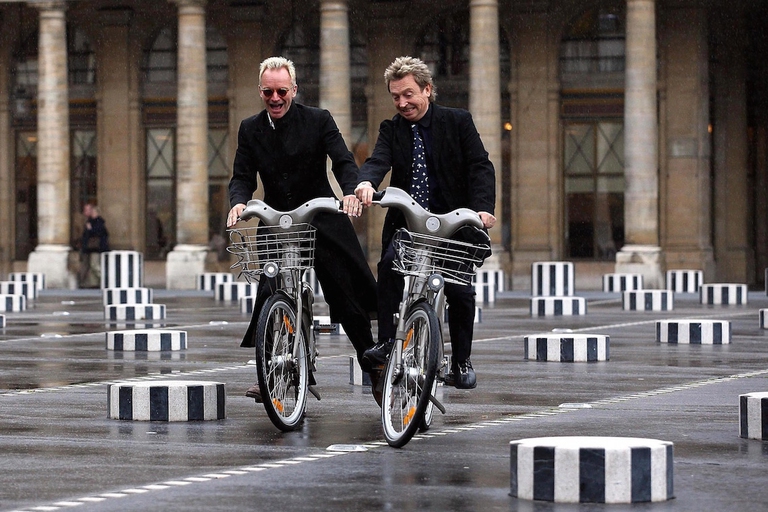
The 26th edition of the United Nations Climate Change Conference, COP26, will be held in Glasgow, Scotland in November 2020. The pre-COP will take place in Milan, Italy.
Will this week bring an agreement to keep the world from tipping into irreconcilable climate change? Perhaps, but regardless of the headlines from COP21, something very important is happening. Some of the biggest gains for the environment are happening on the streets of urban areas the world over. Cities at COP21 and beyond are already
Will this week bring an agreement to keep the world from tipping into irreconcilable climate change? Perhaps, but regardless of the headlines from COP21, something very important is happening. Some of the biggest gains for the environment are happening on the streets of urban areas the world over. Cities at COP21 and beyond are already taking action to change our climate future.
We’re entering a time that former New York City mayor Michael Bloomberg calls “the city century,” when three out of every four people on Earth will live in a city. Their leaders have the power to make huge changes in how millions of people interact with the environment, a pressing issue given also that many major urban areas are coastal and the impacts of rising seas are immediate and serious for them.
Whether developing bike shares, planting trees to help clean the air, developing parks and other green spaces that help cities manage stormwater, planning for changes in sea level or ensuring access to nature (indoor and out) to improve people’s lives, small changes in urban areas matter. Cities are competing to attract residents by becoming greener, more sustainable places where the next generation wants to live. As Michael Bloomberg said, “no longer do mayors see the economy and the environment primarily as conflicting priorities”.
Prior COP meetings led to the Compact of Mayors, a coalition of more than 100 cities whose leaders have pledged to reduce greenhouse gas emissions, pursue solutions for climate resilience and track and report their progress with full transparency. Collectively, these municipalities are on the way to delivering half the world’s emissions reductions by 2020, and recently Rio de Janiero became the first city to be fully compliant with the Compact’s goals.
Thousands of tonnes of carbon are saved each year by shifting urban commutes from cars to bicycles. Paris created the bike-sharing service Velib in 2007, London and Washington DC followed in 2010. Boston launched Hubway in 2011 and since then has tracked some 2 million rides, offsetting more than 80 tonnes of CO2. Today there are more than 700 bike sharing programmes operating in cities all over the world, trumpeting similar results.
“Cities are climate leaders, they are in the best position to effect real change. The actions we take at a local level will have a global impact and, by improving our city, we will be helping create a better world for today’s urban citizens and generations to come,” in the words of Rio de Janeiro Mayor Eduardo Paes. Though we can’t all be in Paris at COP21 we can all head down to city hall to share our concerns with our mayors and city councilors, asking our community leaders to show us their plans for addressing climate change before we vote for them.
Siamo anche su WhatsApp. Segui il canale ufficiale LifeGate per restare aggiornata, aggiornato sulle ultime notizie e sulle nostre attività.
![]()
Quest'opera è distribuita con Licenza Creative Commons Attribuzione - Non commerciale - Non opere derivate 4.0 Internazionale.
The 26th edition of the United Nations Climate Change Conference, COP26, will be held in Glasgow, Scotland in November 2020. The pre-COP will take place in Milan, Italy.
Thanks to activists, the voice of the world’s peoples resounded through the COP25 like an alarm bell. Governments didn’t reach the results they demanded, but their cries and messages were stronger than ever, reaching even those who weren’t in Madrid.
Climate change poses a risk for millions. However, women are the most vulnerable to its negative consequences: a few simple considerations by the Italian Climate Network help us perceive the global implications of this.
The COP25 ended two days late and with very few steps ahead made. Climate negotiations in 2020 will be an uphill battle as political will clearly seems to be lacking, once again.
The last ten years have been the most “exceptional” and hottest decade ever, with extreme weather hitting people and ecosystems harder and more frequently. 2019 is also on course to becoming the second or third hottest year since records began.
Unite Behind the Science: this was the title of the conference held at the COP25 on 10 December. Greta Thunberg’s presence filled the arena, but this time it was scientists’ turn to speak.
25,000 delegates meet for the COP25 from 2 to 13 December. What can we hope this UN climate change conference, whose venue was changed from Santiago de Chile to Madrid, will achieve?
100 eminent people from all over the world, including Vandana Shiva, Naomi Klein and Noam Chomsky, have signed an open letter after the disappointing results of the COP24. A call-to-arms for climate against world leaders’ indifference.
The outcome of the COP24 in Katowice left many unsatisfied. Greta Thunberg, a young Swedish environmental activist, gave a harsh, heartfelt speech addressing world leaders.








